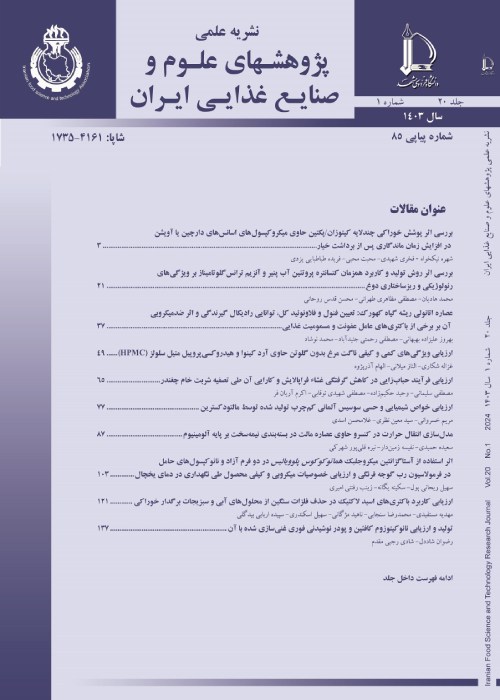Investigating of Tomato Pastes Microbial Contamination in Iran and Isolation and Identification of Alicyclobacillus acidocaldarius by PCR Method
Tomato paste is one of the processed tomato products that has a long shelf life and is used as an important food ingredient all over the world. According to global statistics, Iran is among the top ten producers of tomato paste in the world, Iran ranks fourth to fifth in the world in the field of aseptic paste production. Alicyclobacillus bacteria are considered as a risk for pasteurized acidic food industries. These bacteria enter the product through soil-contaminated fruits, production equipment of the factories and finally produce metabolites such as guaiacol, causing an unpleasant taste in the product.
In order to investigate the microbial contamination of canned tomato paste in the country, 46 samples of canned tomato paste in the amount of 184 cans of 800 grams were purchased from the market. Regarding the purchase of samples from the market, we tried to buy a different production date and production series for each sample (approximately 4 cans for each brand from each production series). The purchased samples were sent to the Microbiology Department of the Standard Research Institute laboratory for microbiology tests. At the same time, the culture media of thermophilic bacteria (Orange Serum Agar, Thermoacidurans Agar from 4 available brands) were tested for performance control. The canned tomato paste samples were incubated at 30°C ± 1°C for 14 days and 55°C ± 1°C for 7 days.
The contents of both examined samples were tested separately for thermophilic bacteria, mesophilic bacteria, mold and yeast. Out of the 46 samples prepared with different production dates and production series, which were 46 cans of tomato paste, 28 samples were positive in terms of contamination with thermophilic bacteria. According to the number of contaminated samples, it was found that 60.86% of the samples were contaminated. Colonies grown on Thermoacidurans Agar medium were examined morphologically. For further investigations, gram staining was performed. All the stained colonies morphologically showed the form of gram-positive rod-shaped bacilli. Biochemical tests including catalase and oxidase were performed to identify Alicyclobacillus species. All the grown colonies were catalase positive and oxidase negative. The final identification of the species was done by performing molecular tests based on specific primers designed from Alicyclobacillus gene. These tests were performed in three stages: genomic DNA extraction, polymerase chain reaction and electrophoresis. Using the PCR method, the grown colonies were analyzed for two types of bacteria, Alicyclobacillus acidocaldarius and Bacillus coagulans. According to the results obtained from sequencing with designed primers in the NCBI database, it showed 100% similarity with the registered sequences, which are all different strains of the Alicyclobacillus acidocaldarius species. None of the colonies were detected as Bacillus coagulans species. Since Alicyclobacillus acidocaldarius was isolated from soil for the first time, the presence of these bacteria in the product indicates the contamination of raw materials with soil.
In this research, the presence of Alicyclobacillus bacteria in canned tomato paste was confirmed. Due to the high heat resistance of this bacteria, there is a possibility of the presence of Alicyclobacillus in the all stages of tomato paste production, which have entered the product through the soil, and 95°C ± 3°C pasteurization temperature in 30 minutes is not effective in removing this bacteria completely. Most acidophilus thermophilic bacteria, such as Alicyclobacillus family, are not pathogenic bacteria. Their presence in food may make the food taste bad or smelly, but it does not pose a risk to the health of the consumer. Therefore, in order to reduce the risk of spoilage and to prevent the growth of bacterial spores in the product, it is essential not to expose the product to high temperatures for a long time. It is also necessary to perform rapid cooling after heat treatment and keep the product at a temperature below 30°C.
- حق عضویت دریافتی صرف حمایت از نشریات عضو و نگهداری، تکمیل و توسعه مگیران میشود.
- پرداخت حق اشتراک و دانلود مقالات اجازه بازنشر آن در سایر رسانههای چاپی و دیجیتال را به کاربر نمیدهد.



